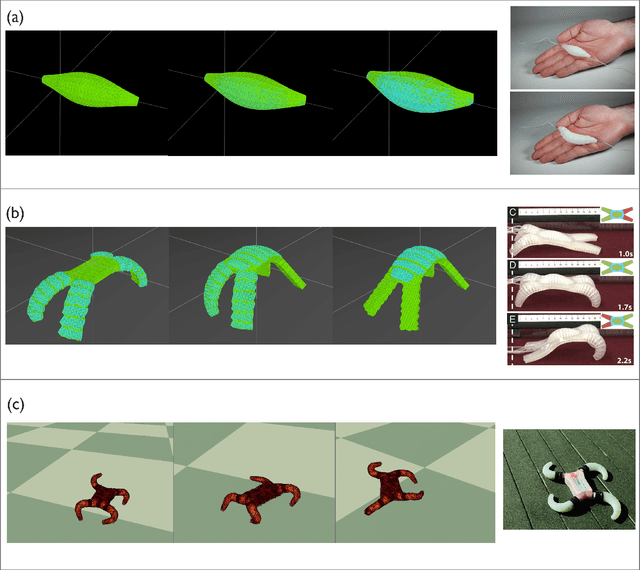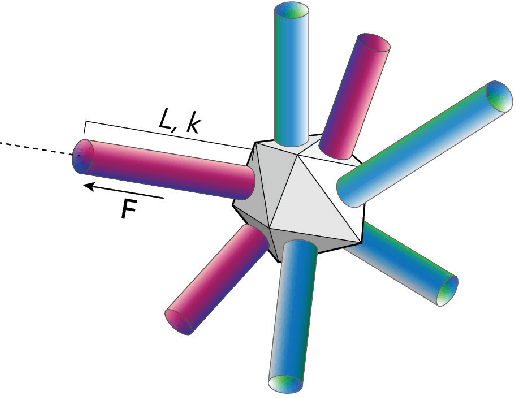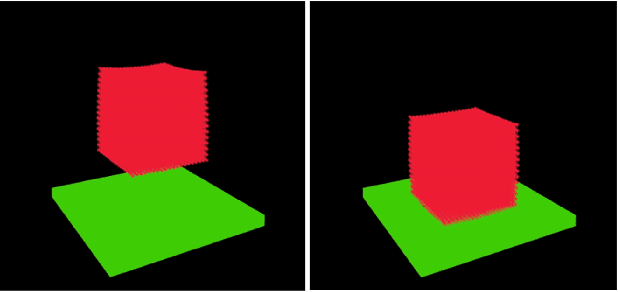Sofia Wyetzner
A Massively-Parallel 3D Simulator for Soft and Hybrid Robots
Jul 19, 2022



Abstract:Simulation is an important step in robotics for creating control policies and testing various physical parameters. Soft robotics is a field that presents unique physical challenges for simulating its subjects due to the nonlinearity of deformable material components along with other innovative, and often complex, physical properties. Because of the computational cost of simulating soft and heterogeneous objects with traditional techniques, rigid robotics simulators are not well suited to simulating soft robots. Thus, many engineers must build their own one-off simulators tailored to their system, or use existing simulators with reduced performance. In order to facilitate the development of this exciting technology, this work presents an interactive-speed, accurate, and versatile simulator for a variety of types of soft robots. Cronos, our open-source 3D simulation engine, parallelizes a mass-spring model for ultra-fast performance on both deformable and rigid objects. Our approach is applicable to a wide array of nonlinear material configurations, including high deformability, volumetric actuation, or heterogenous stiffness. This versatility provides the ability to mix materials and geometric components freely within a single robot simulation. By exploiting the flexibility and scalability of nonlinear Hookean mass-spring systems, this framework simulates soft and rigid objects via a highly parallel model for near real-time speed. We describe an efficient GPU CUDA implementation, which we demonstrate to achieve computation of over 1 billion elements per second on consumer-grade GPU cards. Dynamic physical accuracy of the system is validated by comparing results to Euler-Bernoulli beam theory, natural frequency predictions, and empirical data of a soft structure under large deformation.
Titan: A Parallel Asynchronous Library for Multi-Agent and Soft-Body Robotics using NVIDIA CUDA
Nov 22, 2019



Abstract:While most robotics simulation libraries are built for low-dimensional and intrinsically serial tasks, soft-body and multi-agent robotics have created a demand for simulation environments that can model many interacting bodies in parallel. Despite the increasing interest in these fields, no existing simulation library addresses the challenge of providing a unified, highly-parallelized, GPU-accelerated interface for simulating large robotic systems. Titan is a versatile CUDA-based C++ robotics simulation library that employs a novel asynchronous computing model for GPU-accelerated simulations of robotics primitives. The innovative GPU architecture design permits simultaneous optimization and control on the CPU while the GPU runs asynchronously, enabling rapid topology optimization and reinforcement learning iterations. Kinematics are solved with a massively parallel integration scheme that incorporates constraints and environmental forces. We report dramatically improved performance over CPU-based baselines, simulating as many as 300 million primitive updates per second, while allowing flexibility for a wide range of research applications. We present several applications of Titan to high-performance simulations of soft-body and multi-agent robots.
 Add to Chrome
Add to Chrome Add to Firefox
Add to Firefox Add to Edge
Add to Edge